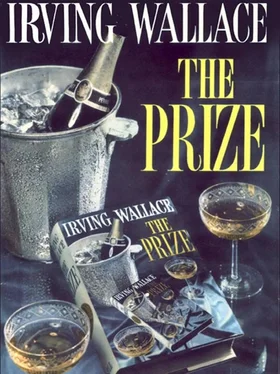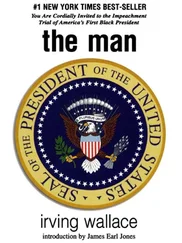Garrett was surprised by the appearance of the man with whom he had so long corresponded. He was unable to define to himself what kind of person he had actually expected to find. Possibly someone more Swedish, more genteel, more dignified. Instead, Öhman, his reddish hair cropped short, resembled, for all his agility, a European middleweight prizefighter, who had fought several years too many. The face, the cauliflower ears, and gross features above a thick neck were not Garrett’s conception of a doctor’s head. And the hands, like blunt instruments, stubby fingers round as sausages, were not a heart surgeon’s hands. Yet Garrett saw at once the face’s kindness, the admiration it now reflected, and from Öhman’s letters he knew the man’s scientific soundness and learning.
‘Uhhh, Dr. Garrett-uhhh, tell me, you must tell me what you think of our Sweden. How thrilled I was when your prize was announced. You had my cable? Uhhh-you must tell me what you have seen here, and wish to see, and what I can do for you. Your wife is with you? You must dine with my wife and me. Uhhh-my patients, they are as much your patients as mine, and you must see them and tell me what you think. And questions, I have a hundred questions.’
He went on and on, punctuating his excitement with his stammer and asking questions that he did not wait to have answered, but when his boyish exhilaration had finally run down, he was ready to listen. He begged Garrett to speak of this and that, and Garrett spoke. Ingrid Påhl was interested and receptive, and Öhman worshipful and memorizing every word for the long winter ahead, and Garrett revelled in the attention. Before Dr. Keller and the therapy group, he had always felt inadequate to hold centre stage. What was the old psychiatrist joke-who listens? But group therapy had given Garrett experience in monologue, and this experience, combined with an attentive audience, now gave Garrett licence to discourse freely and at length.
Garrett had been relating, in some detail, his adventures in California after having been notified of the Nobel award. Now, encouraged by Öhman, he reminisced about the years during his transplantation research, and, rather effectively, he thought, he recreated the dramatic case history of Henry M. He was pleased to note that Ingrid Påhl was enthralled by the last, and Öhman as intrigued by this as he had been by all that had gone before.
At this point, Garrett had the feeling that he had monopolized the meeting long enough. Three-quarters of an hour of autobiography was more than sufficient. The time had arrived for self-effacement. If his battle plan was to work, it was necessary that Öhman be encouraged to reveal more of himself and his career.
‘At any rate, to sum it up, here I am, an actual laureate,’ he said. ‘It’s hard to believe.’ During his monologue, he had taken notice of Öhman’s office, which, except for the padded chairs, seemed furnished entirely in efficient grey metal. But now he realized that two walls of the room were entirely covered by framed photographs and snapshots, some autographed, and Garrett recognized several as former Nobel laureates.
‘You’ve never told me, in your letters, Dr. Öhman, if you have any connection with the Nobel medical awards. Have you?’
‘In a way,’ said Öhman.
Before he could continue, there was a knocking at the door. A trim girl, wearing tortoise-shell-rimmed spectacles on a scrubbed face, backed in pulling a trolley, carrying hot coffee and sweet rolls, after her. Öhman introduced her as his secretary, and she apologized for being late.
After she had poured coffee and gone, and they were all sipping, and nibbling rolls, Öhman cleared his throat. ‘Uhhh-Dr. Garrett-you had inquired about my position in the Nobel picture. Uhhh-a minor one, minor, I assure you, at the same time-uhhh-interesting. Do you know anything of the medical awards?’
‘Miss Påhl was kind enough to give me some background on the drive here.’
‘Very little, Dr. Öhman,’ said Ingrid Påhl. ‘For all I know, Dr. Arrowsmith got the prize.’
Öhman laughed. ‘Well, as a matter of fact he did, did he not? Martin Arrowsmith, Gottlieb, Sondelius-how alive they were to me. What was it Arrowsmith fought? Uhhh-yes-the bubonic plague in the West Indies, yes. Our committee has great respect for plague fighters, but it has always distressed me that some of the best have not been honoured.’
‘Are you referring to anyone in particular?’ asked Garrett.
‘I am,’ said Öhman. ‘Uhhh-it has always been my belief that Walter Reed and General Gorgas, as well as Noguchi, should have shared an award for their work against yellow fever. Gorgas was nominated many times, I am told, but since he had made no new discovery, he could not be elected. Reed died too early, I think. At any rate, that is neither here nor there-more coffee, Miss Påhl?’
He filled Ingrid Påhl’s cup again, and then Garrett’s and his own, and settled back in the chair.
‘Did Miss Påhl tell you of our nominating procedure?’ Öhman inquired of Garrett.
‘Yes,’ said Garrett.
‘Then you know of our special investigators?’
‘No, not that.’
‘I must tell you, then. For it is in that capacity that I have several times served the Nobel Committee. In fact, because of my knowledge of your discovery, I was one of the two so-called experts assigned to investigate your candidacy, Dr. Garrett.’
‘I didn’t know that,’ said Garrett. ‘I really owe you a debt of thanks.’
‘Not a bit,’ replied Öhman. ‘Any fool would have understood the-uhhh-magnitude of your discovery and verified its worth. The Caroline Nobel Committee uses its investigators-detectives, you might call them in America -more than the other prize-giving committees, because of the intricate nature of medical research. There are so many varied specialties. There is so much complexity. Consequently, when the candidates are narrowed down by the committee, one last step is necessary. Each candidate is turned over to a member of our faculty, who is an expert in the candidate’s field. The expert or investigator makes a thorough study of the candidate’s discovery. Is it complete? Is it proved? Is it new? Is it worth while? The investigator will read everything on the discovery, and seek opinions, and sometimes even travel to the homeland of the-of the-uhhh-candidate, to see for himself without giving away the-uhhh-reasons for his visit.
‘When Ivan Pavlov was nominated for the first award in 1901, for his experiments in the physiology of digestion, two of our investigators, the great Professor Johansson and Professor Tigerstedt, travelled to St. Petersburg, in Russia, to meet Pavlov and his dogs and verify, firsthand, his accomplishments. Pavlov was given special attention, too, because it was known that-uhhh-Alfred Nobel himself had been interested in the Russian’s work and had once contributed a large donation to Pavlov. So our investigators went to Pavlov’s laboratory and observed the results of his experiments in conditioned reflexes. Apparently the final report of the investigators was not fully satisfactory, for, as you know, Parlor did not win the first Nobel Prize that year. He had to wait three more years to win it.’
‘Who did win the first medical prize?’ asked Ingrid Påhl. ‘It is shameful of me, and do not repeat it to Dr. Krantz, but I simply cannot remember.’
‘It was a close contest that first year,’ said Öhman. ‘A small number of judges supported Pavlov. The committee’s recommendation was that the award be divided between Niels Finsen of Denmark and Ronald Ross of Great Britain. But there was also substantial backing for-uhhh-Emil von Behring of Germany. Eventually, the debate raged around von Behring. Some considered his discovery of the serum against diphtheria an old discovery and therefore disqualified. Others felt that it should be honoured, because it was long accepted by the public, and would be familiar and noncontroversial. Uhhh-well, von Behring won, he won because his serum was popular-serums always are with our medical judges-and the three losers, Ross, Finsen, Pavlov, won their prizes later, in the next three years.’
Читать дальше












